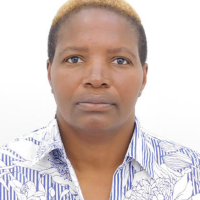Gender-Based Violence and Rule of Law: Improving Protections for Women
The live event webcast will appear on this webpage promptly at 1:00 pm EST. If it does not immediately appear on the webpage, please refresh your screen at 1:00 pm.
In recent years, countries around the world have passed laws criminalizing different forms of gender-based violence. Yet violence remains a serious threat for millions of women and girls who face barriers to reporting violence and accessing support services and resources. Why are laws often insufficient and how can we strengthen implementation? Join the Wilson Center for a conversation that will draw out best practices for preventing and responding to gender-based violence globally—from training police and prosecutors to better data collection, awareness campaigns, and services integration.
To submit a question to our panelists for the Q&A portion, please email mexico@wilsoncenter.org or tag us on twitter using the hashtag #GenderatWilson
This event is part of a Wilson Center series held in recognition of the 16 Days of Activism against Gender-Based Violence (November 25 – December 10, 2020), an international campaign to build awareness and galvanize action in the fight against violence against women and girls.
“All too often the women and girls subjected to violence are violated twice—the first time when they are subjected to violence, and the second time when they seek, and do not find, the services and justice to which they are entitled.”
- Michele Bachelet, former Executive Director of UN Women and former President of Chile
Speaker Quotes
Everjoy Mahuku
“Most of the countries in Sub-Sahara Africa have passed legislation that outlaws or criminalizes some of the practices such as domestic violence, sexual exploitation and abuse, sexual harassment, early child marriage, female genital mutilation in southern Africa. Thirteen of the 16 countries already have domestic violence legislation. Fourteen countries have legislation related to sexual exploitation. And 16 of the countries have signed on human trafficking. However, despite comprehensive laws and policies against GBV, it remains endemic in most of the countries.”
“GBV is a systemic problem rooted in gender power dynamics, and this is something that we need to recognize. Laws and polices alone will not result in behavior change, normative change, or even effective enforcement at local levels. Dominant gender norms often perpetuate systemic GBV in societies and act as a barrier to legal redress for women and adolescent girls. Looking at the region, GBV remains sensitive, hidden, and stigmatized. Across the region, women and adolescent girls do not seek legal redress due to a variety of factors, including fear of reprisal, shame and fear of stigmatization, [and] economic dependence.”
“When you start by saying [that you are going to] change culture, you are likely to face opposition. What we want to do is not to change culture, but to transform the negative practices that are inherent within the cultures. This is something that can actually happen […] because when we are talking about transformation, we are working with and through communities. You want them to identify what are some of the negative practices that are there: ‘let’s talk about child marriages, what are the negative impacts of effects of child marriages.’ When we have conversations with communities you will find that they also want things that are better for their children, and this results in transforming social norms and practices.”
Moushira Khattab
“While laws and policies are a step in the right direction, their impact has yet to be felt on the ground. There are lingering gaps and missing links. Laws are a reflection of the prevailing culture: a culture which needs to shift dramatically. […] Existing laws afford women more rights than those they actually enjoy. So, there is a problem with the application of the law due to cultural reasons. As such, greater efforts are needed to make our timid laws a reality by giving women their full set of constitutional rights."
“[It is very important to build] the capacity of every professional working directly or indirectly with GBV—judges, police officers, government officials, members of the civil society. Most importantly, we must educate society and men at the forefront, that they stand to benefit when there is no gender-based violence, when women get their rights unimpaired.”
"There was a consensus among all of us speakers that we must take an integrated set of measures [and] harmonize laws. You must have policies and strategies, you must have a coordinating entity to coordinate the work of different stakeholders. You must have a disaggregated data base to look at the disparities and target those that need [help] most. Government must work with civil society and other partners like international non-governmental organizations. We must work in partnership. International coordination, international cooperation, allocation of resources, capacity building of all professionals, raising the awareness of society of the benefits they gain from combatting gender-based violence, monitoring and evaluation—these are all measures that must be implemented together. To move forward you have to act in a multi-disciplinary approach and human-rights based—we must not forget that we are talking about the inalienable human rights of women."
Mari Davtyan
“In 2017, we decriminalized battery against family members [in Russia]. So today, battery against a family member […] is not a crime. It is an administrative offense. This is one of the biggest problems that we face, because for battery against a family member you can get a fine, about $100. Moreover, the crimes that we usually see in situations of domestic violence, for example, the intentional infliction of light body injuries, is a crime for private prosecution in Russia [...]. Police and prosecutors are not involved in the investigation, and the victim has to collect evidence by herself and represent the whole case to the judge. Our experience says that in 90 percent of cases, this is impossible for the victim to do without a lawyer or attorney, and moreover it's not safe for victims because Russia doesn't have protection orders or restraining orders, so we do not have any effective mechanism to protect victims."
“Ten years ago, nobody wanted to talk about domestic violence issues. Only women’s NGOs tried to raise discussions about it because, you know, 'this is a family matter.' […]. This traditional approach to family and domestic violence was very popular, even in society. Today, I can say that social researchers show that in Russia, the majority of people know about domestic violence as a problem and the majority of people say that this problem has to be decided by legislation. […]. This is why women have to be represented in all areas, because only women are interested in women’s problems.”
“I believe that when will we have more women in government, when we will have more women in the state, in the council, and the council federation, we will have the laws and we will have policies to combat all the stereotypes and all this traditional culture in police officers and law enforcement areas.”
Mirel Ruiz
There has been a trend to legislation with gender-based violence, or GBV, as a specific public policy issue that needs to be addressed in a specialized, multi-disciplinary and systemic approach. Almost every country in Latin America already has national laws and programs to tackle GBV [...]. There has been a lot of work done in the definition of these crimes, and a lot of work done in the classification of femicide as a crime that has gender components. [...] In theory, it seems like everything has been classified and categorized. However, in practice, there is more to develop in the fieldwork."
"To be honest, in the region, most of the time we don't have enough information, we don't have enough data, to draw conclusions about if these policies are having an impact on the current lives of women and girls."
"We create open channels with [the police], we have built a relationship with them of trust and transparency. [...] And they have been very open, and very receptive to learn because they actually want to understand how to approach victims. It's not simple for them to just act without biases, because they don't necessarily understand what that is. So, for example, we have worked with them on this concept of the 'ideal victim.' [...] They tend to think that every victim looks the same, and every victim maybe has the same behavior. So we work with this kind of exercise to help them realize that every case, every victim is different—every story is completely different—and also how to see victims with this intersectional perspective, to identify what happens in the victim is a migrant, or a victim has disabilities."
Speakers

First Vice Chair of the African Committee of Experts on the Rights and Welfare of the Child; Former Ambassador of Egypt to South Africa and to the Federal Republic of Czechoslovakia; and Former Egyptian Minister of Family and Population



Moderator

Senior Director, Albright Stonebridge Group
Hosted By

Brazil Institute
The Brazil Institute—the only country-specific policy institution focused on Brazil in Washington—aims to deepen understanding of Brazil’s complex landscape and strengthen relations between Brazilian and US institutions across all sectors. Read more


Latin America Program
The Wilson Center’s prestigious Latin America Program provides non-partisan expertise to a broad community of decision makers in the United States and Latin America on critical policy issues facing the Hemisphere. The Program provides insightful and actionable research for policymakers, private sector leaders, journalists, and public intellectuals in the United States and Latin America. To bridge the gap between scholarship and policy action, it fosters new inquiry, sponsors high-level public and private meetings among multiple stakeholders, and explores policy options to improve outcomes for citizens throughout the Americas. Drawing on the Wilson Center’s strength as the nation’s key non-partisan policy forum, the Program serves as a trusted source of analysis and a vital point of contact between the worlds of scholarship and action. Read more


Mexico Institute
The Mexico Institute seeks to improve understanding, communication, and cooperation between Mexico and the United States by promoting original research, encouraging public discussion, and proposing policy options for enhancing the bilateral relationship. A binational Advisory Board, chaired by Luis Téllez and Earl Anthony Wayne, oversees the work of the Mexico Institute. Read more


Middle East Program
The Wilson Center’s Middle East Program serves as a crucial resource for the policymaking community and beyond, providing analyses and research that helps inform US foreign policymaking, stimulates public debate, and expands knowledge about issues in the wider Middle East and North Africa (MENA) region. Read more


Kennan Institute
The Kennan Institute is the premier US center for advanced research on Eurasia and the oldest and largest regional program at the Woodrow Wilson International Center for Scholars. The Kennan Institute is committed to improving American understanding of Russia, Ukraine, Central Asia, the South Caucasus, and the surrounding region though research and exchange. Read more


Maternal Health Initiative
Despite global attention and calls to action, women continue to die while giving birth. The Maternal Health Initiative (MHI) leads the Wilson Center’s work on maternal health, global health equity, and gender equality. MHI works to connect issues critical to global health and women’s empowerment to foreign policy and US leadership, with a focus on improving the lives of women, adolescents, and children around the world. Through collaborations with policymakers, academia, donors, and practitioners, MHI produces cutting-edge research, fosters cross-sectoral engagement, increases awareness of key issues, and informs US leadership on solutions for ending maternal and newborn deaths and addressing gender-based global health issues. Read more
